
Helping Save the Ocean: A Story Blog of My Sustainability Experience
In the present world, where climate change is an ongoing catastrophic threat to everyone, more and more people are embracing the value of sustainability. But what does sustainability mean? And why does it matter? Sustainability means to stop exploiting earth so that we can satisfy our needs without endangering future generations. Sustainability matters because our natural resources are finite and if we maintain the status quo, our world will be irreparably broken. An important problem that needs to be addressed through sustainability activities is the plastic pollution in the ocean. Oceans are essential parts of our lives that form the majority of earth’s surface area, which contain an abundant biodiversity of sea creatures that serve as both sources of food and jobs.
Plastic Ocean
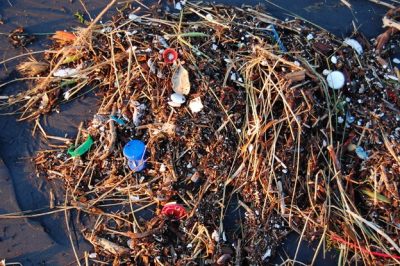
(Krejci, 2010). CC BY 2.0. https://www.flickr.com/photos/kevinkrejci/4408273247
Additionally, the oceans also regulate our climates through both their microorganisms that transform carbon dioxide into oxygen and their heat absorption properties. Unfortunately, despite the ocean’s importance, they are polluted with plastics that harm marine wildlife. As a result, there have been numerous calls for organizations to stop using single-use plastics. However, despite the growing pressure for plastic reduction, many people have still not joined the movement because they are confused about what they need to do and are overwhelmed by its wide scope, which makes them think that their individual actions will not do anything. This blog was written to inspire those individuals to join the fight against plastic pollution in the oceans through my sustainability experience story to show them the way they can help the movement and the importance of their individual actions.
Save The Ocean Poster
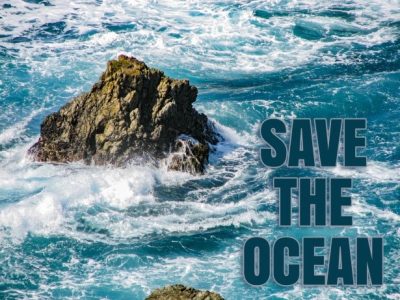
(Denyer, n.d.). CC0 Public Domain. https://www.publicdomainpictures.net/en/view-image.php?image=399803&picture=save-the-ocean-poster
What can you do to help reduce plastic pollution in the oceans?
One way that you can help combat plastic pollution in the oceans is through properly sorting your wastes and recycling your plastic. My first experience with this sustainability aspect/strategy was on a train ride back from my field trip. At that time, I was looking for a rubbish bin in the station to throw my food’s plastic wrap and found five different colored rubbish bins for various types of wastes. There were no written instructions on them, which left me struggling, and since I was in a hurry, I decided to throw it into the green rubbish bin as I thought that green is for recycling all wastes because green is the color of nature.
Eco concept with recycling symbol on dark background, top view
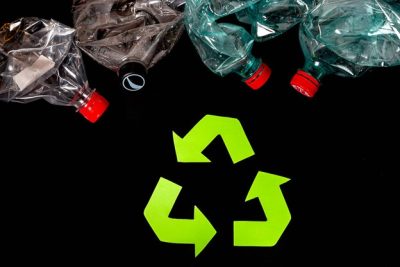
(Verch, 2021). CC BY 2.0. https://www.flickr.com/photos/30478819@N08/51095576034
However, as I tried to dump the plastic, an elderly woman reprimanded me and told me about sustainability, which made me apologize and dump it into the rubbish bin she pointed at. The embarrassing encounter led me to research about the subject, which made me know about the different types of wastes and that I picked the wrong rubbish bin because the green bins in Indonesia are only for organic wastes, while yellow, red, blue, and gray bins are for inorganic (e.g., plastic), hazardous/toxic (B3), paper, and residual (difficult to recycle) wastes respectively. That experience allowed me to understand why some people become confused on how to fight plastic pollution in the oceans through properly recycling their plastics especially when there are no written instructions. However, while you might now see recycling as complicated, proper research and time always made everything easy, as now I can recycle my plastic effortlessly.
Different Colored Rubbish Bins
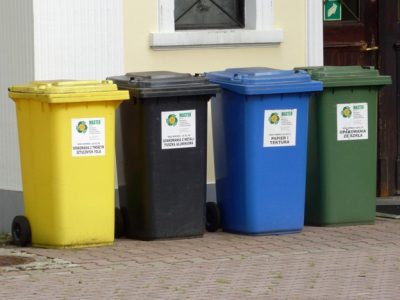
(Pxhere, n.d.). CC0 Public Domain. https://pxhere.com/en/photo/957467
What else can you do?
During my research on the correct rubbish bin color sorting in Indonesia, I came to know about both sustainability and the plastic pollution in the oceans. Although properly recycling your plastic is helpful to keep new plastic away from the ocean, I realized that it is better to reduce/stop using single-use plastic. While it is difficult to stop using plastic, due to its convenience, especially if you are living in developing countries, it is still possible to do it. Some things that you can do to reduce your plastic usage are using reusable bags, reusable water bottles, as well as reusable cutleries and straws that are made of biodegradable eco-friendly materials.
Various Reusable Eco Bags and Bottle Sets
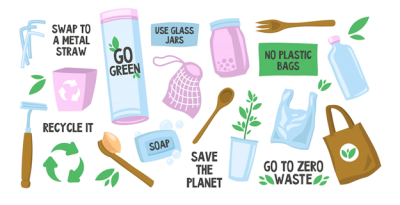
Image by pch.vector on Freepik. Freepik Free License. https://www.freepik.com/free-vector/various-reusable-eco-bags-bottles-set_9651014.htm#query=reusable&from_query=reusable%20items&position=0&from_view=search&track=sph#position=0&query=reusable
My first experience of trying to reduce my plastic usages took place some days after my encounter with the elderly woman. After learning more about sustainability, I started to see the plastic around me differently. In Indonesia, plastic is far more widely used than in Australia, they are sold as shopping bags and water bottles in supermarkets, as well as cutleries and straws in small eateries and food deliveries. Prior to my interest in sustainability, I used to see that abundance as something normal. However, when I knew better, I started to bring reusable shopping bag, water bottle, and cutleries (spoon, fork, and straw) everywhere, my experience since then was a positive one as I managed to save a lot of money and help save the oceans at the same time by reducing my plastic usages.
Save Money
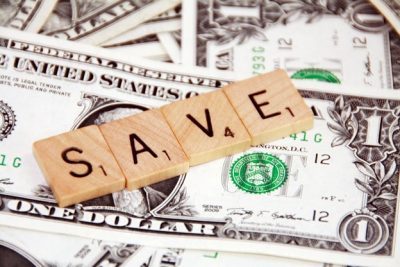
(401(K) 2012, 2010). CC BY-SA 2.0. https://www.flickr.com/photos/68751915@N05/6355840185
Why do your individual actions matter?
Recycling the plastic that we cannot avoid using and reducing/stopping plastic usages are two important sustainability actions that can help fight against plastic pollution in the oceans. At this point, although you have learned the ways that you can do to help the sustainability movement and how easy they are to do with research, time, and having the will to help, you might still be wondering whether your individual actions matter or not. At first glance, your individual sustainability actions might seem to contribute “little” to the fight against the plastic pollution in the oceans when compared to big sustainability campaigns conducted by large organizations. However, you should not underestimate yourself because your “little” sustainability actions are still impactful due to two reasons.
You Matter

(Krebs, 2012). CC BY 2.0. https://www.flickr.com/photos/mrsdkrebs/6900297405
First, your personal sustainability actions are impactful because having people that care and actually act to help fight the problem prevents apathy and makes the supporting momentum for collective sustainability actions/campaigns that fight against plastic pollution in the oceans to become more successful. Second, you can also inspire other people to join the fight against plastic pollution in the oceans which is demonstrated by my experience, where the personal action of an elderly woman that cared about sustainability inspired me to change and learn more about sustainability. In the end, my experience of “conflict” with the elderly woman allowed me to challenge my personal “setback” to sustainability, namely my “common sense” that normalized using plastic everywhere and let me learn the importance of properly recycling our plastic wastes and reducing/stopping our plastic usages. That is why my advice to you is that we should not let our negative thoughts affect the way we think of the impact of our personal actions because our actions as individuals do matter as it can inspire other people and strengthen a collective movement.
Inspiration
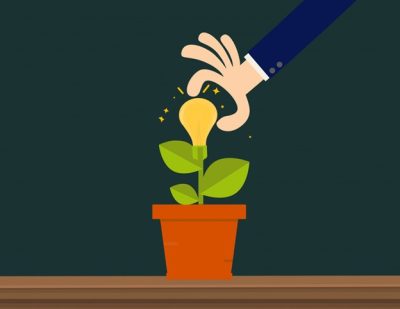
(Pxhere, n.d.). CC0 Public Domain. https://pxhere.com/en/photo/1614571
Conclusion
Now after knowing about my sustainability experience, the things that you can do to help save the oceans from plastic pollution, and the importance of your personal actions, I just want to give a reminder. The most important thing to have in fighting against problems such as the plastic pollution in the oceans and climate change is to have the will inside us to apply sustainability values and practices in our daily lives. Anyway, if you manage to read this, thank you for reading my blog post to the end, you can follow my blog for more insightful sustainability stories in the future. Do your research, get rid of plastic in your lives, and if you are forced to use plastic, properly dispose of them for recycling. If enough of us do that, we can help save our oceans, earth, and future generations.
Ecological Planet Vector Illustration

(OpenClipArt, 2014). CC0 Public Domain. https://freesvg.org/ecological-planet-vector-illustration
